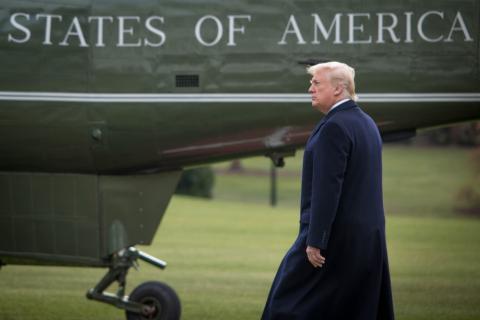On the eve of another government shutdown, President Trump told reporters outside the Pentagon that the effect would be hardest felt by the nation’s military, something that the president’s critics were quick to dismiss as hyperbole.
“If for any reason it shuts down the worst thing is what happens to our military,” Trump said as he was greeted by Defense Secretary Jim Mattis on the steps of the Pentagon. Vice President Mike Pence was along for the visit.
"We are here to support our country's military," Trump said. "If the country shuts down, which very well could be, the budget should be handled a lot differently than it has been handled over the last long period of time, many years"
But divisions over the fate of the nation’s estimated 800,000 DACA recipients are getting in the way of passing a spending bill. In September, President Trump announced the end of the Deferred Action for Childhood Arrivals (DACA) program, giving Congress 6 months to act and prompting a fight over immigration reform.
Republicans in the House said a short-term spending plan introduced by the party did not devote enough money to the military, while, Democrats (whose support is required for passage in the Senate) began putting together opposition from its members in an effort to use the budget talks as leverage to get a DACA bill passed.
Even within each party, divisions exist, making a shutdown all but inevitable.
Republican Senator Lindsey Graham said he would oppose the bill his party has introduced. “I’m tired of it,” said Graham, “This is the fourth one we’ve done, and you’re killing the military.”
Republicans Rand Paul (Ky.) and Mike Lee (Utah) have also previously voted against similar bills, leaving Republicans short of the votes they need for passage.
It’s possible that Republicans could pick up a few votes from moderate Democrats but in a midterm election year, that’s going to be a hard sell. However, it’s unclear if Democrats are really willing to force a shutdown.
In December, a continuing resolution provided enough funds to avert a shutdown that would have taken place on the 22nd of the month. The resolution provided $4.7 billion in emergency funding for the military as well as $2.1 billion for the Veteran’s Choice Act and temporarily lifting automatic sequestration cuts. But all this only lasted until January 19.
This is not the first time in recent history that the military has been affected by a shutdown over a federal budget. In 2013, the government did shut down, affecting military pay.
Military members were paid, however it took an 11th hour continuing resolution and service members were still ordered to show up for duty, whether they were paid or not.
The military is paid on the 1st and 15th of every month, and critics of President Trump say that since the military was just paid on Monday, this shutdown won’t really be so bad for them. But this isn’t exactly the case.
In the event of a shutdown, 75 percent of the Defense Department’s 750,000 employees would not come to work, and this would have a ripple effect.
Civilian employees work alongside active service members in many capacities, meaning that workloads on service members who are required to show up to work would increase to take up the slack or tasks would be left undone.
This includes things like inspections, or contract activities and even things like payroll and personnel activities.
Last month, before the continuing resolution averted a shutdown, the comptroller for the Defense Department said he "cannot emphasize too much how destructive a shutdown is."
"The disruption of this ripples through the organization and is very destructive," Norquist said.
Photo Credit: Michael Candelori / shutterstock.com
